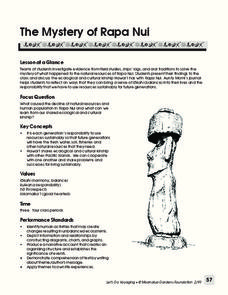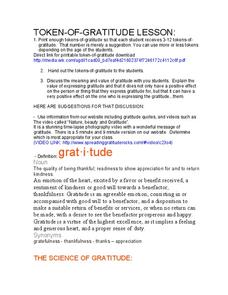Discovery Education
Clutter Cutter
Challenge young learners to cut the clutter with this fun engineering project. As employees of a home and office supply company, young engineers are asked to develop devices that organize everyday items. After participating in a...
Teach Engineering
Photosynthesis—Life's Primary Energy Source
Wouldn't it be great if you could produce your own food? Scholars learn about the processes of photosynthesis and cellular respiration in plants. They consider how to use photosynthesis as a model of an efficient system and how to apply...
Los Angeles Unified School District
River Systems
Scholars must react to the ecosystems of a river. They use inquiry-based learning along with maps and visuals to better understand the impact of rivers on everyday life. To finish, they create final written projects and presentations.
Moanalua Gardens Foundation
The Mystery of Rapa Nui
What caused the collapse of the environment on Rapa Nui (Easter Island)? Who constructed the Moai? What was their purpose? Class members assume the role of investigators and use evidence drawn from field studies, ships' logs, and...
National Library of Medicine
Electricity, Frankenstein, and the Spark of Life
Shocking! After viewing a short clip from the 1931 movie, Frankenstein and reviewing electricity references in Mary Shelley's novel, class members examine Luigi Galvani's and Alessandro Volta's observations on electricity and muscle...
Curated OER
The Chesapeake Bay in Captain John Smith's Time
When Captain John Smith visited the Chesapeake Bay in the summer of 1608, what types of animals and habitats did he encounter? Your young historians will analyze primary source documents to answer this question, as well as compare the...
PBS
Making Change: Revolutionary Tactics of the Civil Rights Movement
The film American Revolutionary: The Evolution of Grace Lee Boggs introduces viewers to the differing philosophies of and strategies employed by 1960s civil rights leaders such as Malcolm X and Martin Luther King, Jr. and the debate over...
Carnegie Mellon University
Bathtub Model
Using a colorful infographic handout and a guide sheet, hold a class discussion about how a bathtub can serve as a model for the greenhouse effect created by Earth's atmosphere. Participants will understand that as energy or matter is...
Curated OER
The Global Precipitation Measurement Mission (GPM) Lesson
Introduce your class to one of the ways that technology is benefiting humanity. The Global Precipitation Measurement Mission involves the data collected by nine satellites from different countries with a united focus on studying world...
Teach Engineering
Biological Processes: Putting Microbes to Work
Is there such a thing as useful microbes? Get ready to perform experiments on applying microbes for wastewater treatment. The first installment of the three-part unit provides background information to prepare young engineers for two...
Mr. E. Science
Forces
May the mass times acceleration be with you. The presentation covers forces, Newton's three Laws of Motion, momentum, and vectors.
Mr. E. Science
Energy and Power
Teens often display potential energy in class and kinetic in the hallways. This third presentation covers the six types of energy, each in potential and kinetic form. It also covers the Law of Conservation of Energy and Einstein's Theory...
Science Matters
Island Fox Outreach
Off the coast of California lives a wild animal called the Island Fox. Experts discuss the importance of the Island Fox to the Channel Islands and the balance the fox creates within its ecosystem. The lesson concludes with a reading of...
Learning for Life
Lesson 7: Stimulants
Make sure your class is aware and informed of the various types of stimulant drugs that exist. Here, they can learn their alternate names and some of their harmful effects. While this is a very basic direct-instructional lesson, the...
Mr. E. Science
Sound
Since light travels faster than sound, some people may appear bright until you hear them speak. The presentation covers what sound is, how fast it travels in various mediums, properties of sound, hearing, and the parts of the human ear.
US National Library of Medicine
Basic Genetic Concepts and Terms
Have you ever wondered why you aren't taller or invisible? It all comes down to your dominant and recessive genes. Introduce your class members to genetics with a presentation that includes worksheets for young geneticists to complete...
Spreading Gratitude Rocks
Token of Gratitude
What would the world be like if everyone expressed gratitude? Pupils explore the concept by watching a motivating time-lapse video. Scholars express appreciation by handing out tokens of gratitude, and then write about their experiences.
PBS
Technology: Conveniences and Consequences
It's a delicate balance—using technology to improve our lives while still protecting the environment, and ourselves, from the hazards of technology use. Class members examine statistics about the increase in media use, complete a survey...
Houghton Mifflin Harcourt
That’s Amazing!: Challenge Activities (Theme 3)
Synonym dominoes, anyone? As part of the activities designed for kids who have mastered the basic concepts in the Houghton Mifflin Harcourt thematic unit That's Amazing! kids are offered a variety of activities that include developing a...
The New York Times
Investigating the Heroin and Prescription Opioid Epidemic
How bad is the opioid crisis in America? Has it gotten worse in the last few decades? Why? High schoolers delve into these questions with a thorough and thoughtful lesson from The New York Times on heroin prescription opioids. Starting...
Orange County Water Atlas
Location, Location, Location…
Young geographers discover not only how to read and recognize coordinates on a map, but also gain a deeper understanding of latitude and longitude and how climate changes can vary significantly across latitudes.
Channel Islands Film
Island Rotation: Lesson Plan 4
Foster's Rule? Allopatric speciation? After watching West of the West's documentary Island Rotation, class members use Venn diagrams to compare endemic species on the Channel Islands with mainland related species. They then create a...
Teach Engineering
Quantifying Refraction
Class members discover how mathematics can quantify the behavior of light waves with the fourth installment of a seven-part series that teaches future engineers about equations related to refraction, including the equation to calculate...
Curated OER
Bermuda Triangle
Young scholars explore what the Bermuda triangle is and the theories as to why it is so mysterious. In this mystery lesson students read and discuss the history and the mystery behind the Bermuda Triangle.

























